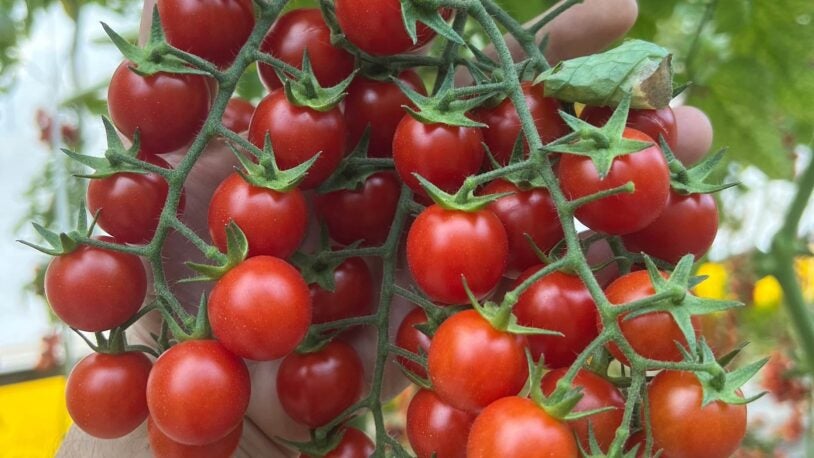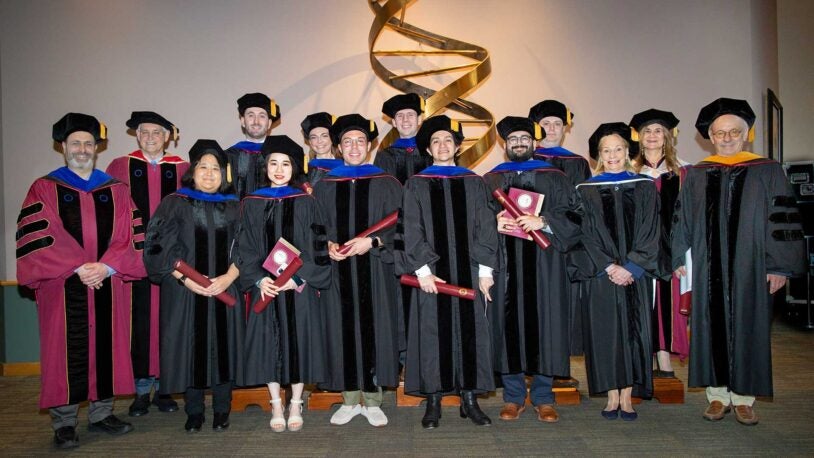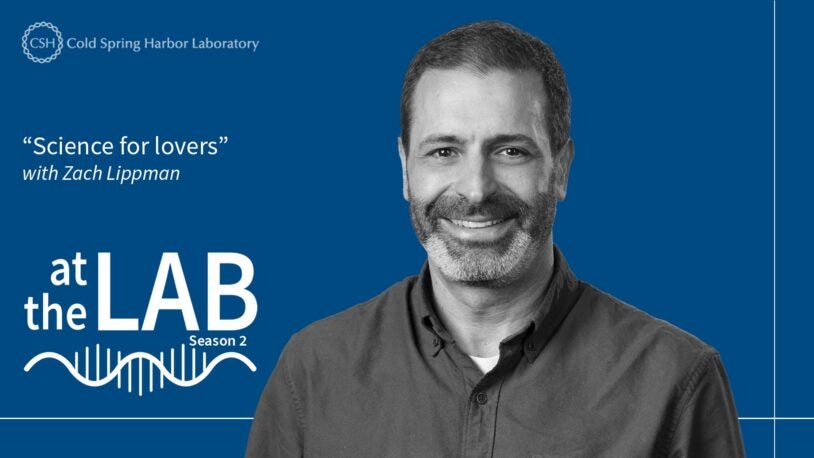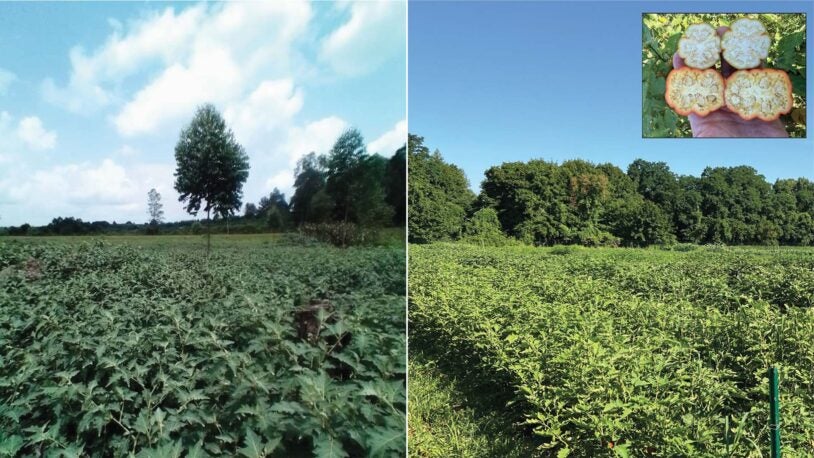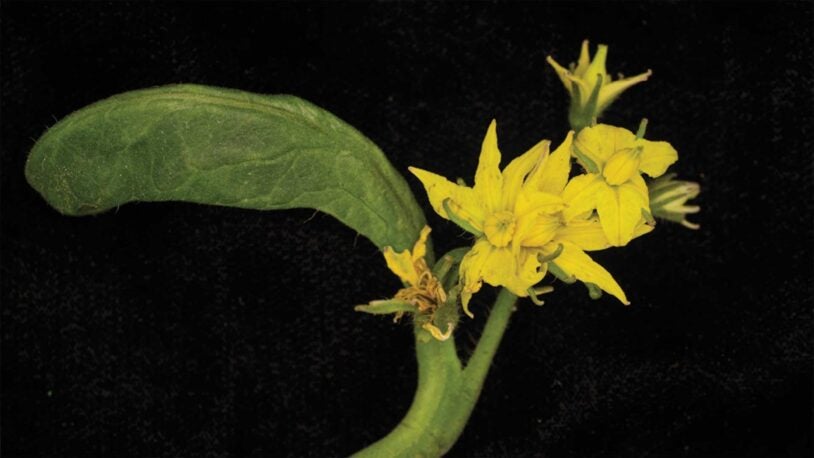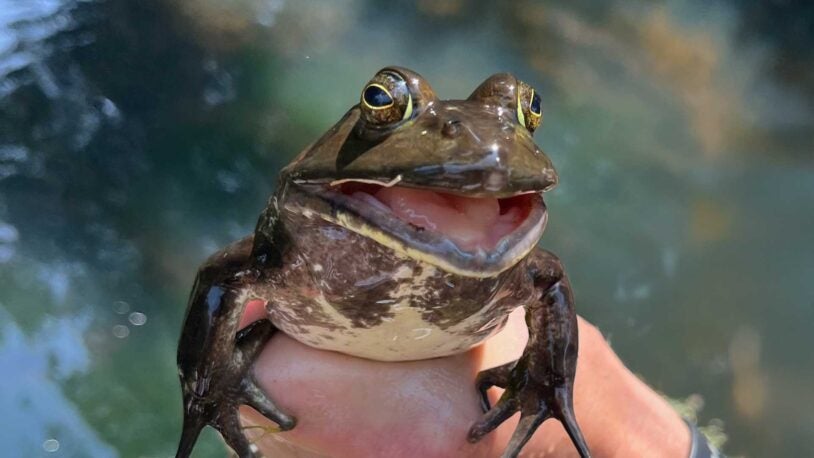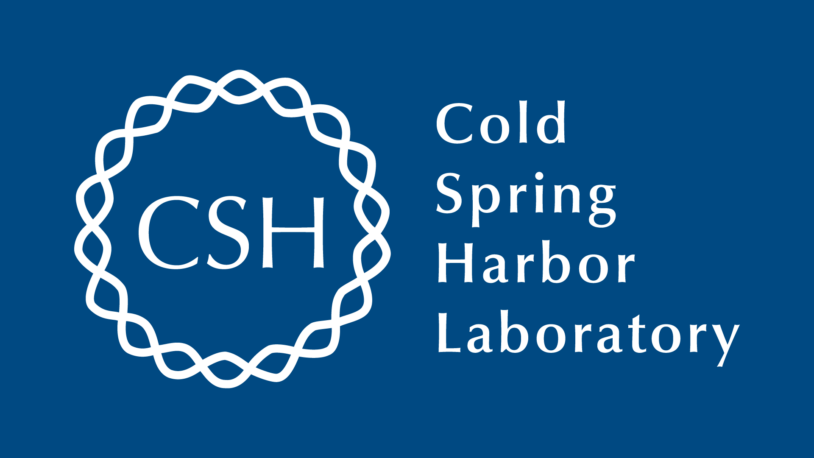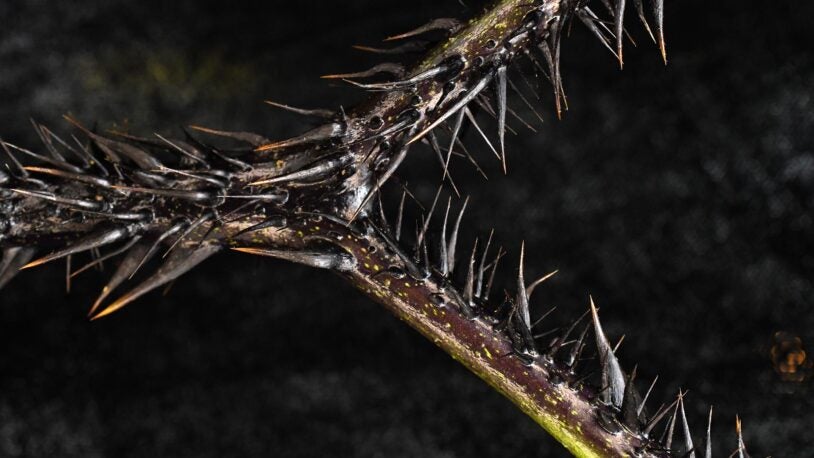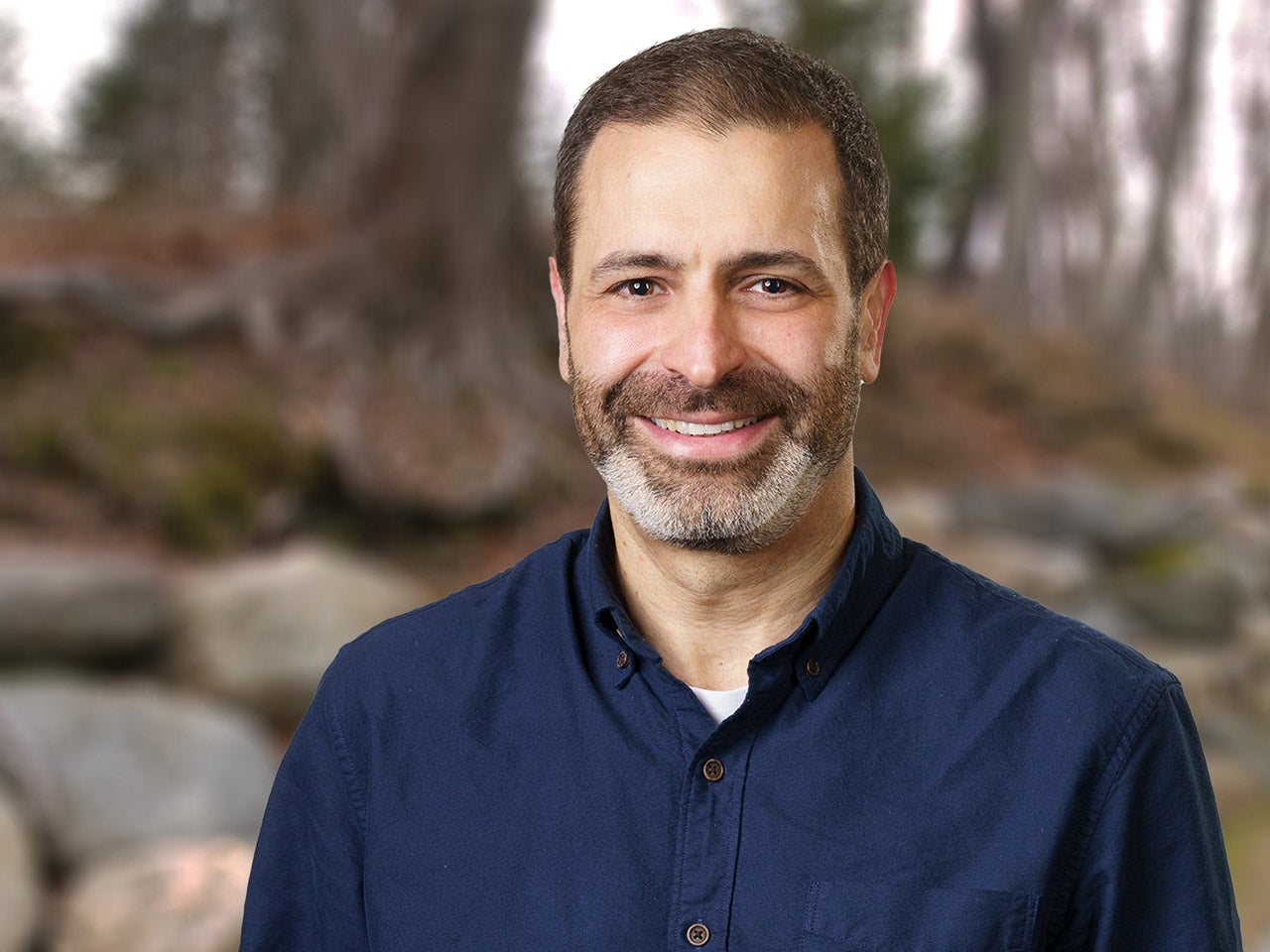
Zachary Lippman
Professor & HHMI Investigator
Jacob Goldfield Professor of Genetics
Director of Graduate Studies
Ph.D., Watson School of Biological Sciences at Cold Spring Harbor Laboratory, 2004
lippman@cshl.edu | 516-367-8897
My research team studies when and where, and how many branches, flowers, and fruits are produced on plants. All of plant development depends on small groups of stem cells at the tips of shoots known as meristems. By studying the genes that control stem cell production and maturation over space and time, within and between different developmental contexts, we are able to manipulate plant architecture and reproduction to improve crop yields.
Zachary Lippman’s research program integrates development, genetics, genomics, and genome editing to uncover, explore, and exploit the mechanisms that determine how plant stem cells become shoots and flowers. The lab takes advantage of extensive natural and engineered genetic variation that influence vegetative and inflorescence production and architecture in tomato and related nightshade (Solanaceae) species (e.g. potato, pepper, groundcherry) to explore how differences in these processes explain the remarkable diversity in the architectures of these shoot systems found in nature and agriculture. Recent discoveries on the genes and networks underlying this diversity have led to broader questions on the significance of genomic structural variation, genetic redundancy, gene dosage, and epistasis in development, evolution, domestication, and breeding. By linking these fundamental and applied discoveries, Lippman is developing and applying innovative concepts and tools to accelerate crop improvement.
Branching out: Tomato genes point to new medicines
July 9, 2025
Why are some vines straight and others branched? CSHL’s answer could help scientists fine-tune plant breeding techniques and clinical therapeutics.
CSHL celebrates SBS Class of 2025
May 7, 2025
The CSHL School of Biological Sciences conferred nine Ph.D.s and one honorary Doctor of Science degree during its 22nd commencement ceremony.
The CSHL School of Biological Sciences’ class of 2025
May 5, 2025
The School of Biological Sciences awarded Ph.D. degrees to nine students this year. Read some of their stories and reflections on their time at CSHL.
At the Lab: Science for lovers
April 15, 2025
You can’t spell evolution without l-o-v-e. A tale of passion and curiosity takes us from New York to Australia, France, the U.K., and South America.
CSHL and global collaborators map Solanum pan-genome
March 5, 2025
Landmark study carves a path for plant breeders to improve crops across the globe and expand the variety of produce available in grocery stores.
CRISPR manipulates plants’ flower powers
February 19, 2025
CSHL Professor Zachary Lippman and postdoc Amy Lanctot have discovered how similar fragments of DNA control flowering in distantly related plants.
Frog Pond
November 27, 2024
These hopping amphibians aren’t the only animals that call the pond home. It’s a living snapshot of our area’s diverse ecosystem.
At the Lab Season 1 Research Rewind: Genetics
October 22, 2024
It’s the code for all life on Earth. This week At the Lab, we’re hacking it with the help of Cold Spring Harbor Laboratory’s geneticists.
Making headlines
September 11, 2024
Several Cold Spring Harbor Laboratory faculty members received national mainstream media attention in 2024.
One Experiment: The devil in the greenhouse
August 15, 2024
CSHL’s meanest plant may help the Lippman lab tame prickly indigenous crops like Australia’s desert raisin.
All Publications
Solanum pan-genetics reveals paralogues as contingencies in crop engineering
5 Mar 2025 | Nature
Benoit, Matthias; Jenike, Katharine; Satterlee, James; Ramakrishnan, Srividya; Gentile, Iacopo; Hendelman, Anat; Passalacqua, Michael; Suresh, Hamsini; Shohat, Hagai; Robitaille, Gina; Fitzgerald, Blaine; Alonge, Michael; Wang, Xingang; Santos, Ryan; He, Jia; Ou, Shujun; Golan, Hezi; Green, Yumi; Swartwood, Kerry; Karavolias, Nicholas; Sierra, Gina; Orejuela, Andres; Roda, Federico; Goodwin, Sara; McCombie, W; Kizito, Elizabeth; Gagnon, Edeline; Knapp, Sandra; Särkinen, Tiina; Frary, Amy; Gillis, Jesse; Van Eck, Joyce; Schatz, Michael; Lippman, Zachary;
Antagonizing cis-regulatory elements of a conserved flowering gene mediate developmental robustness
25 Feb 2025 | Proceedings of the National Academy of Sciences of the United States of America | 122(8):e2421990122
Lanctot, Amy; Hendelman, Anat; Udilovich, Peter; Robitaille, Gina; Lippman, Zachary;
Cryptic variation fuels plant phenotypic change through hierarchical epistasis
25 Feb 2025 | bioRxiv
Zebell, Sophia; Martí-Gómez, Carlos; Fitzgerald, Blaine; Pinto Da Cunha, Camila; Lach, Michael; Seman, Brooke; Hendelman, Anat; Sretenovic, Simon; Qi, Yiping; Bartlett, Madelaine; Eshed, Yuval; McCandlish, David; Lippman, Zachary;
Antagonizing cis-regulatory elements of a conserved flowering gene mediate developmental robustness
5 Nov 2024 | bioRxiv
Lanctot, Amy; Hendelman, Anat; Udilovich, Peter; Robitaille, Gina; Lippman, Zachary;
Solanum pan-genomics and pan-genetics reveal paralogs as contingencies in crop engineering
14 Sep 2024 | bioRxiv
Benoit, Matthias; Jenike, Katharine; Satterlee, James; Ramakrishnan, Srividya; Gentile, Iacopo; Hendelman, Anat; Passalacqua, Michael; Suresh, Hamsini; Shohat, Hagai; Robitaille, Gina; Fitzgerald, Blaine; Alonge, Michael; Wang, Xingang; Santos, Ryan; He, Jia; Ou, Shujun; Golan, Hezi; Green, Yumi; Swartwood, Kerry; Sierra, Gina; Orejuela, Andres; Fornaguera, Federico; Goodwin, Sara; McCombie, William; Kizito, Elizabeth; Gagnon, Edeline; Knapp, Sandra; Sarkinen, Tiina; Frary, Amy; Gillis, Jesse; Van Eck, Joyce; Schatz, Michael; Lippman, Zachary;
Convergent evolution of plant prickles by repeated gene co-option over deep time
2 Aug 2024 | Science | 385(6708):eado1663
Satterlee, James; Alonso, David; Gramazio, Pietro; Jenike, Katharine; He, Jia; Arrones, Andrea; Villanueva, Gloria; Plazas, Mariola; Ramakrishnan, Srividya; Benoit, Matthias; Gentile, Iacopo; Hendelman, Anat; Shohat, Hagai; Fitzgerald, Blaine; Robitaille, Gina; Green, Yumi; Swartwood, Kerry; Passalacqua, Michael; Gagnon, Edeline; Hilgenhof, Rebecca; Huggins, Trevis; Eizenga, Georgia; Gur, Amit; Rutten, Twan; Stein, Nils; Yao, Shengrui; Poncet, Adrien; Bellot, Clement; Frary, Amy; Knapp, Sandra; Bendahmane, Mohammed; Särkinen, Tiina; Gillis, Jesse; Van Eck, Joyce; Schatz, Michael; Eshed, Yuval; Prohens, Jaime; Vilanova, Santiago; Lippman, Zachary;
Engineering the future of Physalis grisea: A focus on agricultural challenges, model species status, and applied improvements
2 Jul 2024 | Plants People Planet
Dale, Savanah; Tomaszewski, Elise; Lippman, Zachary; Van Eck, Joyce;
Blooming balloons: Searching for mechanisms of the inflated calyx
28 Jun 2024 | Current Opinion in Plant Biology | 81:102595
He, Jia; Van Eck, Joyce; Lippman, Zachary;
Evolutionary conservation of receptor compensation for stem cell homeostasis in Solanaceae plants
Jun 2024 | Horticulture Research | 11(6):uhae126
Seo, Myeong-Gyun; Lim, Yoonseo; Hendelman, Anat; Robitaille, Gina; Beak, Hong; Hong, Woo-Jong; Park, Soon; Lippman, Zachary; Park, Young-Joon; Kwon, Choon-Tak;
Extreme restructuring of cis-regulatory regions controlling a deeply conserved plant stem cell regulator
4 Mar 2024 | PLoS Genetics | 20(3):e1011174
Ciren, Danielle; Zebell, Sophia; Lippman, Zachary; Hake, Sarah;
